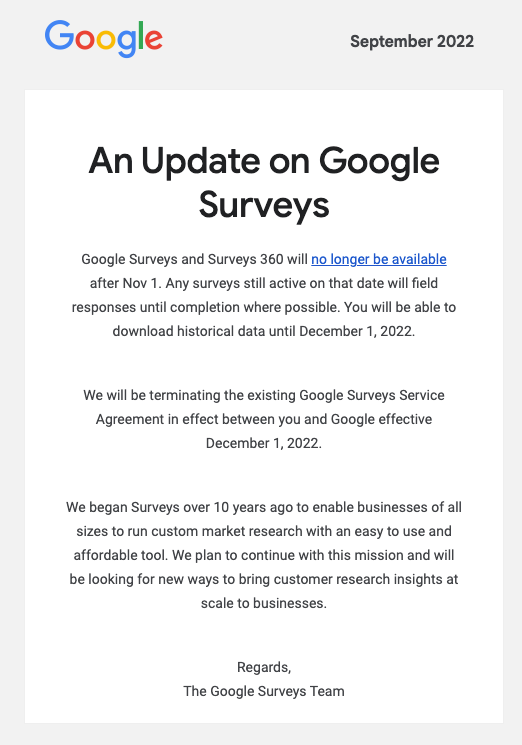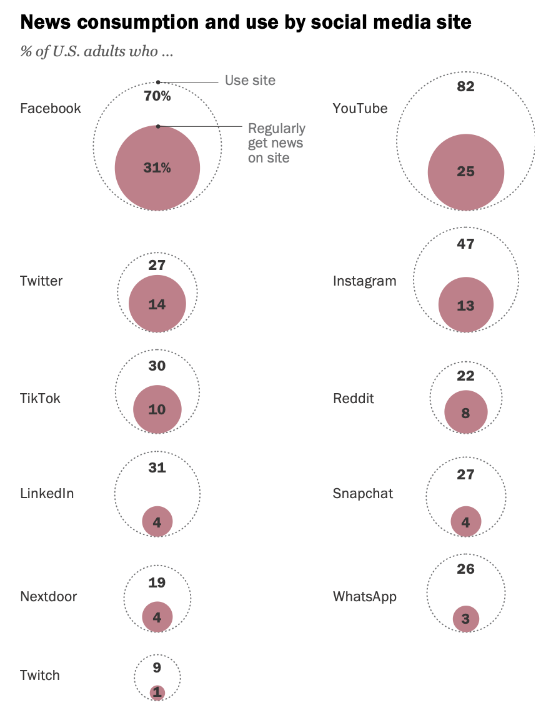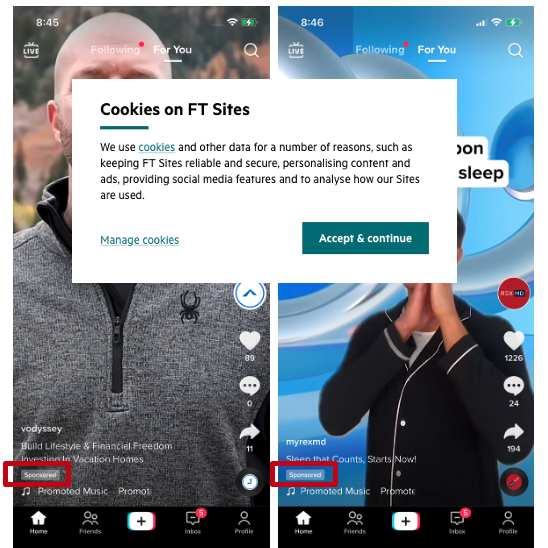Google Surveys RIP, Nextdoor Local News, Dark Patterns Abound

Google Kills 'Consumer Surveys'
Google is in cost-cutting mode. The company will stop making laptops and discontinued half its "Area 120" projects. And just yesterday it notified Google Consumer Surveys users that it was sunsetting the product on December 1, 2022. Survey data will no longer be available after that date. Google didn't fully explain the rationale but said, "We do not believe the existing product is the best way to do this going forward. The Surveys team will be working to find new ways to bring the scale & insights of our research network to customers via Google Ads products for advertiser, customer, and market research." There were limitations but Consumer Surveys was a cost effective way to do research, though over time it became more expensive. Briefly it offered SMB survey capabilities as well. There was a revenue-sharing program for publishers, where users completed surveys to access otherwise gated content. Consumer Surveys now joins the list of products that have been, to quote Mike, "sh$tcanned."

Our take:
- Google: "While we believe in our mission of enabling businesses ... to run custom market research with an ... affordable tool," this is not it.
- We'd like to believe something better and still affordable will succeed Consumer Surveys. We're not holding our breath.
- Google is driven by self-interest (as most are). When products no longer serve those interests they change or die. That is the way.
Nextdoor Local News?
According to recent survey data from the Pew Research Center, "half of U.S. adults get news at least sometimes from social media." That's been true for a number of years. Interestingly, the numbers are inching down versus two years ago, with the exceptions of Instagram and TikTok. Facebook remains the overall leader with 31% of adults getting their news "sometimes" from the site. Instagram saw a modest uptick (1%) over the past two years, but TikTok has seen an 11 point gain from 2020, which parallels its general usage growth. Nextdoor appears in the data for the first time this year, with 4% getting news on the site – equivalent to LinkedIn, which has a news team. Nextdoor is in need of content or tools to more frequently engage users. It's worth considering news, through media partnerships or potentially building out a team that could create and/or curate news from third party sources (see Reddit). Patch failed but Nextdoor should explore this idea.

Our take:
- Nextdoor is trying to build out a local social graph to create more regular engagement. It's not clear whether it's having any success.
- Most recent earnings report: weekly users 37 million; daily users ~19 million. It should be much higher than that given that Nextdoor was founded in 2010.
- There are many ideas on the whiteboard but local news should be explored, given there's some organic usage already (w/o a product).
Internet Awash in 'Dark Patterns'
So-called dark patterns are rampant online, from Google's minimizing of ad labels, to routine cookie banners and difficult-to-use privacy controls. A new FTC report (.pdf) explores the rococo world of online dark patterns, which are often built into site design or the presentation of content. Dark patterns are usually directed toward extracting money, concealing material information (fine print) or getting consumers to give up data. "As more commerce has moved online, dark patterns have grown in scale and sophistication," asserted the FTC. Users have become so accustomed to seeing some of these things they may not recognize them as "dark patterns" at all. Examples include cookie banners that prompt "accept," or "native advertising" designed to mimic content with tiny ad labels, or publications that make subscribing easy and cancellation hard. People may be inured to these practices because they're so common. One could argue Facebook's entire business model is built around dark patterns.

Our take:
- Dark patterns are as old as selling. But internet companies have refined it into a discipline of sorts with analytics and A/B testing.
- As I've argued in the past, opt-out privacy controls are in practice a dark pattern, because they're often buried or intentionally confusing.
- The FTC says it will continue "scrutinizing these practices" but only the most egregious ones are likely to see any enforcement actions.
Recent Analysis
- What's in Store: The Real-Time Inventory Revolution, by Greg Sterling
- Near Memo 82: Google Astroturfing, iOS search #fails, search alternatives are blooming, why now?
Short Takes
- Google releases fifth version of the product reviews update.
- Case Study: AI content detected and punished by HCU update.
- Meta offering new tools for creators as YouTube and TikTok outflank.
- Google lets short video creators join YouTube Partner Program.
- Study: YouTube feedback buttons have no impact on recommendations.
- Salesforce makes big promises with Genie: first "real-time CRM."
- Salesforce's Slack introduces Canvas, a new collaboration tool.
- TikTok moderation rules "bent" for influencers with more followers.
- TikTok now the most valuable platform for D2C brands, per report.
- Amazon makes seller-shipping software free, to expedite deliveries.
- Walmart teams up with Snap, TikTok, Roku to reach Gen Z shoppers.
- 1MRobotics intros automated dark stores for e-commerce fulfillment.
- High fees, "chores" causing some to bail on AirBnB for hotels (WSJ).
- How to leave Russia Google searches surge as war drags on.
- Alphabet, Amazon, Meta, Apple spent $32B on acquisitions since 2019.
Listen to our latest podcast.

How can we make this better? Email us with suggestions and recommendations.

